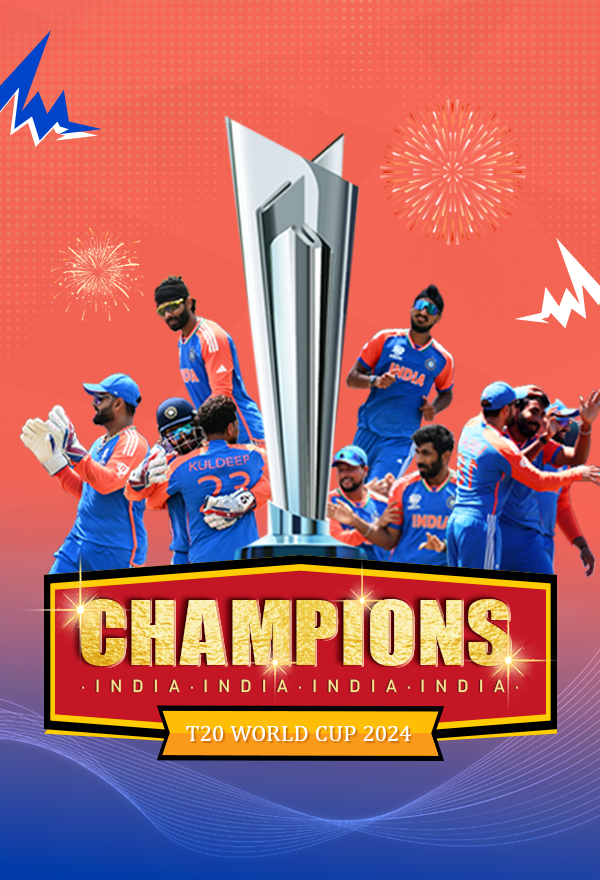
News Update
Tezzbuzz|15-02-2025
In a move that has sent ripples through the cricketing world, the Indian cricket team has decided to opt out of participating in any warm-up matches leading up to the ICC Champions Trophy 2025.
This decision marks a significant departure from the traditional approach to tournament preparation, where teams typically engage in practice matches to acclimatize to conditions and fine-tune their strategies.
As the cricketing community buzzes with speculation and analysis, we delve deep into the reasons behind India’s bold strategy and what it could mean for their performance in one of cricket’s most prestigious tournaments.
The Official Announcement: Breaking Down the Decision
BCCI’s Statement
The Board of Control for Cricket in India (BCCI) recently confirmed that the Indian team will not be participating in any of the scheduled warm-up matches before the ICC Champions Trophy 2025. This announcement came as part of the ICC’s release of the warm-up match schedule, which notably excluded India from the list of participating teams.
Timing and Context
The decision was unveiled shortly after India’s comprehensive 3-0 victory in the ODI series against England, adding an interesting context to the team’s preparation strategy. This timing suggests that the team management feels confident in the squad’s current form and readiness for the tournament.
Reasons Behind the Decision: A Strategic Move?
Recent Fixture Congestion
One of the primary factors influencing India’s decision to skip warm-up matches is the team’s recent busy schedule.
The Indian cricket team has been engaged in a high-intensity three-match ODI series against England, concluding just days before the Champions Trophy is set to begin.Player Workload Management
With the grueling schedule of modern cricket, where players often transition from one series or tournament to another with minimal breaks, the decision to opt out of warm-up matches can be seen as a strategic move to manage player workload and reduce the risk of fatigue or injury.
Confidence in Team Preparedness
The Indian team’s recent performance, including the comprehensive victory against England, has bolstered confidence in the team’s readiness for the Champions Trophy.
The management believes that the squad has had ample opportunity to hone their skills and strategies in competitive matches leading up to the tournament.Focus on Targeted Training
By skipping warm-up matches, the Indian team can allocate more time for targeted training sessions, focusing on specific skills and strategies tailored for the Champions Trophy conditions and opponents.
Implications of Skipping Warm-up Matches
Potential Advantages
- Reduced Risk of Injury: Warm-up matches, while beneficial for match practice, also carry the risk of player injuries. By choosing to skip these fixtures, India is minimizing the risk of losing key players to last-minute injuries.
- Element of Surprise: With no recent warm-up performances to analyze, opponents may find it challenging to formulate specific strategies against India.
- Extended Recovery Time: The extra days without competitive matches allow players more time to recover from the previous series and prepare mentally for the tournament.
H3: Potential Challenges
- Lack of Acclimatization: Without warm-up matches, the team might miss out on the opportunity to adapt to local conditions, especially considering the tournament is co-hosted by Pakistan and the UAE.
- Limited Match Practice: For players who might not have been part of the recent ODI series, the lack of match practice could be a concern.
- Team Combination Uncertainty: Warm-ups often help in finalizing team combinations, a process that the Indian team will now have to manage differently.
Reactions from the Cricketing Community
Expert Opinions
The decision has sparked a range of reactions from cricket experts and former players. Some have praised it as a progressive approach to tournament preparation, while others have expressed concern about the potential lack of match practice in conditions similar to those expected during the tournament.
Fan Reactions
Indian cricket fans have shown mixed reactions on social media platforms. While some support the decision, trusting the team management’s judgment, others worry about the team’s readiness for the high-stakes tournament.
Comparative Analysis: Other Teams’ Approaches
Teams Opting for Warm-ups
Several teams, including Afghanistan, South Africa, Bangladesh, and New Zealand, have chosen to participate in the scheduled warm-up matches. These teams will have the opportunity to assess their strengths and weaknesses in conditions similar to the main tournament.
Teams Following India’s Lead
Interestingly, England and Australia have also decided not to participate in any practice matches, possibly indicating a shift in how top teams approach tournament preparation.
India’s Alternative Preparation Strategy
Intensive Training Camps
In lieu of warm-up matches, it’s expected that the Indian team will engage in intensive training camps. These camps are likely to focus on:
- Simulated match scenarios
- Condition-specific training drills
- Strategic planning and team bonding exercises
Utilizing Technology and Data Analysis
Without the benefit of on-ground practice in tournament conditions, the Indian team is likely to rely heavily on:
- Advanced data analytics to study opponent strategies and player performances
- Virtual reality simulations to familiarize players with expected playing conditions
- Detailed video analysis of recent performances in similar conditions
Potential Impact on India’s Tournament Performance
Early Tournament Form
One of the key concerns is how the lack of warm-up matches might affect India’s form in the early stages of the tournament. Historically, teams have used warm-up matches to shake off any rust and get into the rhythm of tournament play.
Adaptability to Conditions
Without the benefit of warm-up matches in the host countries, India’s ability to quickly adapt to local pitch and weather conditions will be crucial. The team’s first match against Bangladesh in Dubai on February 20 will be a true test of their adaptability.
Mental Preparedness
The psychological aspect of entering a major tournament without the usual build-up of warm-up matches cannot be overlooked. The team’s mental conditioning and ability to hit the ground running will be critical factors in their performance.
India’s Past Tournament Preparations
Examining India’s performance in previous ICC tournaments concerning their warm-up match participation can offer valuable context:
- Analysis of India’s warm-up match performances vs. tournament performances in the last 3 ICC events
- Correlation between warm-up match results and overall tournament success for top teams
The Geopolitical Angle: India’s Tournament Schedule
All Matches in Dubai
An interesting aspect of India’s Champions Trophy 2025 campaign is that all of their group-stage matches are scheduled to be played in Dubai. This decision, likely influenced by geopolitical considerations, adds another layer to the team’s preparation strategy.
Impact on Preparation
With all matches in Dubai, India’s decision to skip warm-ups might be less impactful than if they were playing across different venues. However, it still raises questions about missed opportunities to experience match conditions in Pakistan, where other crucial matches might be played later in the tournament.
Fan Engagement and Media Coverage
Social Media Buzz
The decision has sparked significant discussion on social media platforms, with fans and cricket enthusiasts debating the pros and cons of India’s approach. Hashtags to India’s Champions Trophy preparation have been trending, indicating high public interest in the team’s strategy.
Media Analysis
Cricket journalists and commentators have been providing in-depth analysis of India’s decision. The coverage has ranged from supportive editorials highlighting the potential benefits of this approach to critical pieces questioning the wisdom of entering a major tournament without match practice.
Looking Ahead: What This Means for Future Tournaments
H3: Potential Shift in Preparation Strategies
India’s decision, especially if it leads to success in the tournament, could potentially influence how teams approach preparation for future ICC events. It might lead to a reevaluation of the importance of warm-up matches versus targeted training and player rest.
H3: ICC’s Stance
The International Cricket Council may need to reassess the structure of pre-tournament fixtures in light of top teams opting out. This could lead to changes in how warm-up matches are scheduled and their overall significance in the tournament framework.
Expert Opinions and Analyses
Former Players’ Perspectives
Gathering insights from former players adds depth to the analysis:
- Quote from (Former Indian Captain) on the pros and cons of this approach
- Perspective from (International Cricket Commentator) on how this might affect India’s tournament start
Sports Psychologists’ View
Insights from sports psychology experts on the mental aspects of entering a major tournament without warm-up matches:
- Impact on player confidence and readiness
- Strategies to maintain competitive edge without match practice
A Calculated Risk or a Misstep?
As the cricketing world eagerly awaits the commencement of the ICC Champions Trophy 2025, India’s decision to forgo warm-up matches stands out as a bold and intriguing strategy. This approach challenges conventional wisdom and sets a new precedent in tournament preparation.
While concerns about lack of acclimatization and match practice are valid, the potential benefits of having a well-rested, focused team cannot be overlooked. India’s recent form and the confidence of the team management in their preparation methods add weight to this unconventional approach.
Ultimately, the success of this strategy will be judged by India’s performance in the tournament. Will they hit the ground running, leveraging their fresh legs and focused preparation? Or will the lack of warm-up matches leave them struggling to find their rhythm in the crucial early stages?
As cricket fans and pundits alike debate the merits of this decision, one thing is certain: India’s approach to the ICC Champions Trophy 2025 has added an extra layer of intrigue to an already highly anticipated tournament.
Whether this bold move pays off or backfires, it will undoubtedly provide valuable insights into the evolving landscape of cricket preparation and strategy at the highest level.
The cricketing world watches with bated breath as India embarks on this unique journey, potentially setting a new paradigm for how teams approach major tournaments in the future.
As the first ball of the Champions Trophy 2025 approaches, all eyes will be on the Men in Blue, eager to see how this gamble unfolds on the international stage.

Punjab Kings Star Ruled Out Of AUS vs SA T20Is After Blow On Head From Kagiso Rabada

'Quality of India vs England wasn't as good as Ashes 05': Mike Atherton dismisses 'best series' tag despite Oval drama

Glenn Maxwell targets early impact at 2026 T20 World Cup, embraces floating role

Brutal Blow By Rabada In 2nd T20I Ends PBKS Star ODI Debut Hopes, Injury Crisis Hits Squad Amidst SA Series







